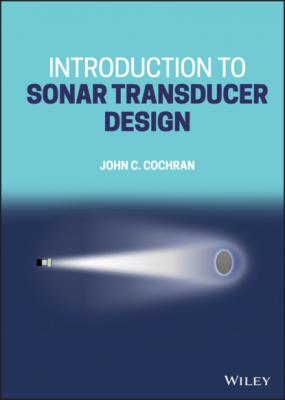ТОП просматриваемых книг сайта:
Introduction to Sonar Transducer Design. John C. Cochran
Читать онлайн.Название Introduction to Sonar Transducer Design
Год выпуска 0
isbn 9781119851073
Автор произведения John C. Cochran
Жанр Отраслевые издания
Издательство John Wiley & Sons Limited
Unfortunately, the process of “coming up to speed” in transducer design is made very difficult by the lack of specific texts that address the subject. There are texts that address the mechanics of piezo‐electric materials and texts on acoustic theory, but there are very few texts that address the broad range of topics associated with underwater transducer design. As a result, I was constantly bombarded with “rules of thumb” that had their basis in sound physical principles but for which no one could account. Not being one to accept the “rules of thumb” on faith alone, I have endeavored to understand the basis for the theories that are applicable to underwater transducer design. It is these basic principles that I hope to document in this text.
I consider the text to be an introductory text in underwater acoustic transducer design. The text walks through the development of various theories starting from the first principles. In some cases, the mathematical development may lead someone to think that I should have jumped to the answer sooner. However, it is for the beginner in this field that I have written this book. The beginner should feel that he can follow mathematical development completely. I have put many of the intermediate mathematical steps into this text.
Though written for the beginner in this field, the text is also for the advanced student or practicing engineer. The mathematical development is fairly thorough and requires some experience with advanced mathematical functions (such as Bessel’s functions) in order to get the most out of it.
The text is divided into five chapters. The first chapter explores the physics of the acoustic medium outside of the transducer. Since the purpose of a transducer is to generate sound in the water, we must understand the parameters that impact the design of the transducer and its ability to produce acoustic power.
Chapter two begins the development of transducer theory by developing equivalent circuits for simple mechanical and acoustical systems. These principles can sometimes be applied to transducer design but more generally lead to a physical understanding of how a mechanical/acoustical transducer works.
Chapter three addresses acoustic waves in solids. In this chapter, we specifically develop the theory for sound propagation in solids that will ultimately impact the design of the transducer. A transducer is a solid device through which acoustic energy flows. We must understand the propagation of acoustic energy in solids in order to design transducers. The chapter starts off with acoustic waves in non‐piezo‐electric solids and then moves into a thorough discussion of waves in piezo‐electric solids. Piezo‐electricity is reviewed to the point that it is applicable to transducer design.
Chapter four discusses projectors. This chapter brings together elements from the first three chapters. Tools and limitations to projector design are reviewed.
Chapter five discusses hydrophones. Sensor self‐noise and its impact on system design are thoroughly discussed in this chapter.
Enjoy.
John C. Cochran, PhD
Конец ознакомительного фрагмента.
Текст предоставлен ООО «ЛитРес».
Прочитайте эту книгу целиком, купив полную легальную версию на ЛитРес.
Безопасно оплатить книгу можно банковской картой Visa, MasterCard, Maestro, со счета мобильного телефона, с платежного терминала, в салоне МТС или Связной, через PayPal, WebMoney, Яндекс.Деньги, QIWI Кошелек, бонусными картами или другим удобным Вам способом.

